#Djinn Stories
Text
The Nightmare Cycle by Lawrence Dagstine - Now available in Barnes & Nobles
Just here today real quick to announce that my latest horror collection, The Nightmare Cycle, from Dark Owl Publishing, is available in Barnes & Nobles. Not just Amazon or horror specialty stores and conventions. You can obtain it online or through “select physical stores,” probably the ones that have a horror section. If they don’t have it in stock, it can usually be obtained within two business…
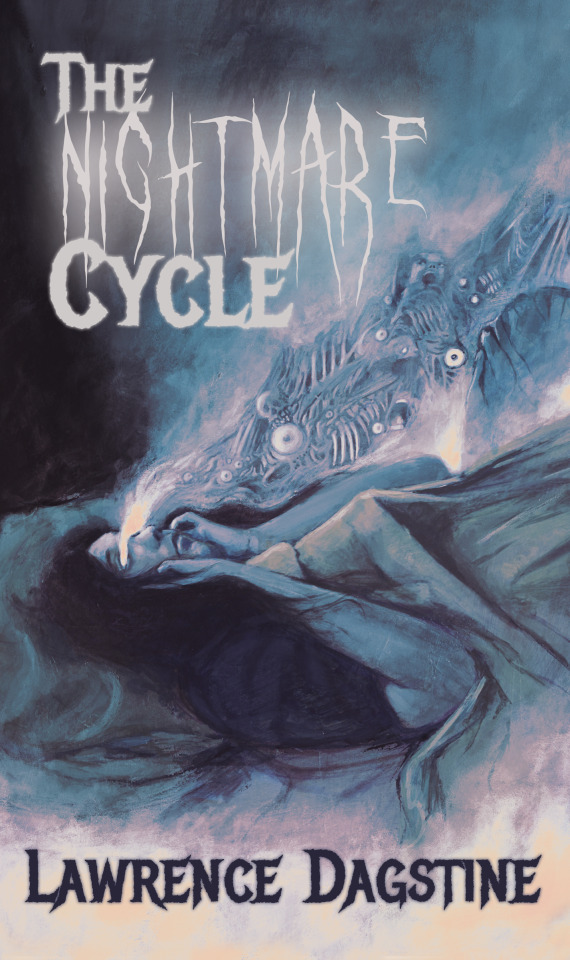
View On WordPress
#Barnes and Nobles#Barnes and Nobles Horror#Book Recommendations#Books about Nightmares#Books worth Reading#Bookstores#Dagstine Books#Dagstine Fiction#Dark Owl Publishing#Djinn Stories#Family Horror#Horror Collections#Lawrence Dagstine#Lawrence Dagstine Books#Lawrence Dagstine Horror#lawrence Dagstine Horror Books#Lawrence Dagstine The Nightmare Cycle#New Book Releases#New Books#New Horror Books#Nightmares#Publishing#Scary Books#Scary Stories#Short Fiction#Short Stories#Short Story Collections#The Nightmare Cycle#The Nightmare Cycle Barnes and Nobles#The Nightmare Cycle by Lawrence Dagstine
0 notes
Text
Little Dami found a Genies Lamp!
Little Dami has made A Wish!
Damian, nine, is tired of his instructors and training. Physically, he's tired. He wants a break.
He hides out in an old room in Nanda Parbat, and finds the stereotypical genies lamp, like from the stories one of his American nannies told.
"I wish I never, ever had to walk again."
It's said in jest, and quietly. He doesn't mean it.
Desiree, however, doesn't care.
By the time Talia finds him, Damian is slamming a metal pitcher on the ground, shouting about kicking a Djinn's ass.
He has a...fish tail.
That is. Not ideal, in a desert.
#dpxdc#dcxdp#dp x dc#dc x dp#phanfic#story prompt#mermay#talia calling up bruce “beloved do you know how to kill a djinn?”#Bruce: “...why?”#“Talia: ”Because one has cursed your blood son.“#“Bruce: ”my WHAT.“
695 notes
·
View notes
Text
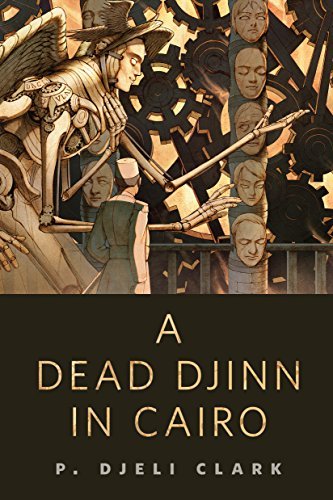
#short stories#short story#a dead djinn in cairo#phenderson djèlí clark#p. djèlí clark#p djèlí clark#dexter gabriel#21st century literature#american literature#african american literature#black literature#english language literature#have you read this short fiction?#book polls#completed polls
68 notes
·
View notes
Photo

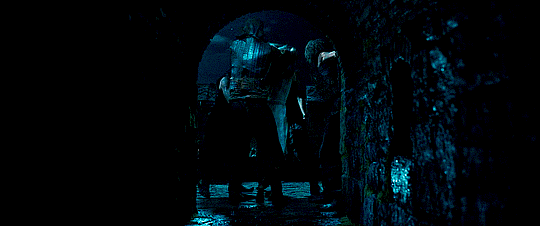
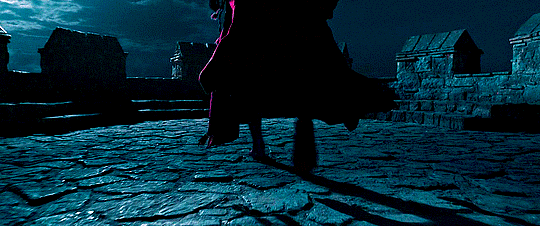

Three Thousand Years of Longing (2022)
George Miller
#three thousand years of longing#george miller#ece yüksel#idris elba#mygifs#filmedit#myth#stories#fairy tales#narrative#gifset#djinn#eblis
143 notes
·
View notes
Text
When Nandor takes out the Djinn lamp to wish Guillermo back into a human its the original Djinn's lamp. The Djinn gave him a little bitty lamp for the wedding present right. 3 wishes. Is it possible it's a different Djinn in that one and he forgot about it?
#wwdits#what we do in the shadows#wwdits s5 spoilers#wwdits spoilers#nandermo#guillermo de la cruz#wwdits season 5#nandor the relentless#wwdits season 5 spoilers#harvey guillen#maybe i just need to let the Djinn story line go?#maybe Nandor will wish to be human with Guillermo?
38 notes
·
View notes
Text
Tabled 6
“Change the vocabulary!” Myka has just exclaimed in a hotel room in an airport in Chicago, in a full-throated effort to bring Helena around to her newly realized way of thinking, here in this story occasioned by @barbarawar ’s months-ago @b-and-w-holiday-gift-exchange request regarding what would have happened if Myka and Helena had had their Boone-proposed coffee. Much has ensued since then: meetings poor and poorer, rendering hopes faint and fainter, leaving potentials squandered and... squandereder? Seeing to it that emotional moves make sense is always challenging, I find. People want to make sense to themselves, want to make sense of themselves, and someone as thinky as Myka would, I imagine, double-want that. But while we all contain multitudes, we tend to bumble through situations as unfull representations of those multitudes: weird gotta-keep-moving sharks desperate to present consistency. I too keep moving: trying to land this thing, even as it fights against the stick, remaining *this far* above ground. Apologies as always, my strung-along giftee. See part 1, part 2, part 3, part 4, and part 5 for the convoluted way we got here.
Tabled 6
“What?” Helena says, but it’s not her usual “what”; she’s obviously flummoxed, and her echo of Myka’s characteristic bafflement is precious. Preposterous, but precious.
Myka had hoped for some spark of recognition at her transformation of “change the rules,” but the confusion... it might be better. Sweeter. She tries not to make too much meaning out of this chime of similarity, even as she wants to pull that soft, bewildered “what” from the air and cradle it.
“I was trying to be clever,” she says. “Never mind that. And never mind fixing it, because we can do something else.”
“Repair it?” Helena says: a cautious, skeptical—and, yes, still baffled—synonym proffer.
Don’t laugh, Myka instructs herself, but faced with the idea that Helena really might think they’re playing a word game, it’s hard to follow her own order. “Never mind that too,” she says, a chuckle bubbling in her throat. “Because never mind. Because that’s it. Because you know what we actually can do?”
Helena raises her hands up, high, obviously in question, but really for all the world as if she were indeed being held at gunpoint.
This is not ending as it began, Myka tells the universe. Not as it began, or any other way.
She chambers the only bullet she has, aiming it right at Helena’s heart.
She pulls the trigger with a smile: “Ignore it.”
Hands still high, Helena opens her mouth slightly, and she squints, as if Myka has morphed into a dangerously unidentifiable animal.
Yes, Myka thinks, wildly, trying to live up to that wariness, I’ve been genetically engineered right here in this island of a hotel room! A Warehouse agent crossed with a yawper who has her very own plans! Amorphous ones, but! This infusion of abandon—Moreau power?—gives her the strength to hold Helena’s gaze.
The standoff lasts until Helena gets her language working again. “That recommendation is... entirely specious,” she says. “And you sound uncharacteristically overwrought.”
It’s a wobbly pair of objections. Myka draws even more strength from Helena’s lack of conviction. “What if it is? What if I am?”
“I don’t believe the slate can be wiped clean,” Helena says, a little more firmly. “Nor do you.”
So you do think we know each other. “I’m not saying it can. I’m saying I know it’s dirty, and so do you. I’m saying we ignore it.”
Helena’s face, from her “what” until now, has been a study in something Myka honestly never expected to see from her: full (fully wrong-footed) incomprehension. Myka doesn’t blame her, for she’s finding herself pretty incomprehensible, but she presses on. “You were ready to ignore my Boone-changed opinion of you. Weren’t you. When you hoped I’d know I was the someone else.”
After a pause: “That was then,” Helena says, her resentment at Myka for having worked her way to that truth—and for having articulated it—very clear.
“Oh, not anymore?” Myka pushes. “Even though now we both know I was that someone, and that there wasn’t a Giselle?”
“That was then,” Helena repeats.
Wait... “There’s a Giselle now?” Myka can’t process it, if it’s so. If it’s so, she will have to let Helena leave, then bury her face in one of the expensive pillows from this room’s unignorable bed and scream.
Another head-toss, the most dramatic one thus far, accompanies Helena’s next words. “I’m of a mind to say yes. But pursuant to my previously articulated policy, I’ll tell the truth: there isn’t, but there could be. In the future. I agreed to meet with you today to ensure you wouldn’t mistake yourself over Pete, but I have no intention of stepping into a similarly mistaken place. I’ve done my best to let this go.”
Myka can’t accept any of those words. “Ignore that too,” she says. She would like to point out that that whole litany was pretty rich, coming from Ms. To-Continue-to-Speak-Together, but instead she zeroes in on what seems the clearest contradiction. “But if you’re letting this go, why do you care about me mistaking myself over Pete?”
“Why did you care about me mistaking myself in Boone?” Helena counters, sour.
The response is uncharacteristically incompetent, particularly because Helena already knows the answer. “I could repeat something somebody once told me, about not walking away from what she called ‘your truth,’” Myka says, with what she hopes is a “that was then” fillip. “But I won’t. What I’ll really say is, I asked you first.” She allows herself a half-breath to marvel at how unusual it is for her to have this much of the upper hand.
“I could say the same thing.” Helena is visibly struggling not to acknowledge Myka’s advantage, but she collapses, saying, “The former, not the latter. I didn’t ask you first,” her devotion to accuracy (or so Myka reads it) defeating her. “Nevertheless I could repeat the something somebody once told you. As the why.”
Myka continues to press. “But isn’t repetition boring? You hate being boring.” She hopes this observation might visit upon Helena that kick of so we do know each other: “I bet you threw your coffee on me just so I wouldn’t walk away thinking how dull you’d been.”
“That was not the reason,” Helena says, but with a press of lips that suggests a ripple of otherwise.
Here, Myka shouldn’t press. “Then what was the reason.”
“You were being recalcitrant, and you know it,” Helena says.
“And what are you being now?” Myka asks, as laconically—as lean-back, as Helena-esque—as she can.
That question causes Helena to scowl and move energy into her hands, extending and then bending her fingers; though she doesn’t quite form them into fists, her intent is clear: she wants to deck Myka. It’s glorious. Please, do it, Myka urges internally, so we can get this all out in the physical open.
But Helena resets her face and waves her hands, the flutter of fingers dispelling the energy and its threat. “Realistic,” she says, prim.
Quit acting like me, Myka would tell her, but for the fallout. What she says is, “I wish I still had this coffee,” pointing at the table, the tragic cup-ceremony of which probably now deserves replaying as farce. Or was it farce the first time? No surprise, really, that they would skip-jump their way over the natural course of history.
“Yes, because stains solve problems,” Helena sarcastics.
Maybe; maybe not. Nevertheless, Myka says what’s true: “You seemed to think they would. And anyway, they redound to your benefit.” Helena greets this with a completely reasonable additional “what,” but Myka blows past it with, “Maybe because you ignore them? Anyway, this one here”—she gestures to the now-dry coffee-map on her shirt (it looks like no country, and she’s disappointed to be unable to name it as “this Brazil” or “this Azerbaijan”)—“kept me from walking away when you thought I shouldn’t.”
“A delaying tactic,” Helena says, offering only bored disdain, as if the very idea of it had been in the end inconsequential.
Keep pushing. “How long was that delay supposed to last, anyway?”
Helena doesn’t have an answer; Myka knows it because she begins to pace. She starts, of course, at the doorway, then walks past the bed, over to the window, and back again: bed then doorway, doorway then bed, bed then window, back and forth—six times, Myka counts—before she leans her back against the door, crosses her arms over her chest, and says, “Why are you tempting me this way? Why this way? What’s changed? In this room, in the few breaths since resignation and coffee, what’s changed?” It’s a fret.
“Well, what’s changed for you?” Myka asks, with no fret at all for once in her life. “More breaths since, but why did authority let you out of Boone-prison?”
Helena’s face produces an inscrutable scowl-smile hybrid. She thrusts herself away from the door, walks to the bed, rubs her hands together. Re-gathering energy? “I suppose I could offer a long-winded explanation about having been given to understand that the balance of safety and threat had shifted. But instead, to quote: ‘What I’ll really say is, I asked you first.’”
“Well played,” Myka admits. In return, she’s gifted with the little acknowledging bow of head she loves. (Loves—yes.) It draws her physically closer, that head-bow: only a few shuffling inches, but enough that she can answer, more quietly, “What’s changed is I saw a future. And I saw how much I’m willing to ignore to have it.”
“I do not understand your morality,” Helena says. This time, she sounds a note of wonder rather than censure.
So much recursion in what they say, think, feel, do—once, then back again, and then again. Maybe they’re bound to get something right, if they try everything over and over? This particular repetition-with-variation seems a little better than usual, tragedy repeated not as farce but as fairy tale... or, no: Warehouse tale. Because for better or worse, there’s no escaping the Warehouse, the curse but also blessing of wonder. She and Helena are here together today only because of the Warehouse—that necessary condition of their meeting and connection.
Myka could dilate forever upon fate and purpose, but “ignore it” must be her mantra now, her grounding principle. For better or worse... for better and worse. The true moral of any Warehouse tale.
“I don’t understand anybody’s morality,” she says, “especially not mine or yours. I’m not trying to. I’m ignoring that too.”
But what she can’t ignore—not now, not anymore—is the way in which their bodies have, so gradually, continued to near, with Helena slowly mirroring Myka’s movements, these little distance-closing developments. So small is the gap between them now, the displacement it would take to touch surely must be measured by time, not distance.
And yet she hesitates, for this raise of hand must speak correctly: not want, but offer.
Slow. Stretch that time, turn it back into space.
She does that, moving as slowly as she can. More slowly than she ever has.
Helena doesn’t retreat.
Minimalist increments... yet their yield is immense: Myka’s right hand meets Helena’s left, and their fingers link and twist, palms not pressed but near.
It is their first genuinely mutual touch since Boone.
“I will be blunt,” Helena says, soft, burred by the contact. “I need you to... just say.”
Blunt. This knife of request—indeed unsharp—meets Myka’s fears, at first bending against them, yet still bearing threat. The force of it makes her glance away, and again she’s drawn to the clock. All she can find to articulate is, “I missed my flight.”
It could have been a way of saying, but Myka didn’t mean it like that, and Helena knows it: she raises an eyebrow. The leavening takes away the knife, and it gives Myka leave to lighten too, to postulate, “Maybe we’re constitutionally incapable. Of the saying. Or maybe it’s just me? Okay, not maybe—probably. Is that a dealbreaker?”
Now Helena cocks her head, completing the gesture with a lifting twist of chin. It calls of early, early: Helena handcuffed in a chair, Myka foolishly imagining she knew how all the ensuing moments would go—then being flung up to meet the ceiling.
The book would have known that would happen, but Myka didn’t. Hasn’t. Flights, crashes. Over and over, each as unpredictable as every other. Which will Helena choose to inflict now?
“Have we agreed to a deal?” Helena asks. The question isn’t coy. “Ignoring may be a way forward, but historically, you do seem to presuppose the existence of agreements that you fail to inform me I’m a party to. That you then accuse me of violating.”
So: an objection, but one grounded in their shared history. A flight and a crash. “That is an uncomfortably accurate description of what I do,” Myka admits. “Let me start again. I missed my flight. Did you?”
“Miss your flight? Yes.” More leavening: unfunny joking, words for the sake of them. To continue to speak together... of course this has been what Myka wished too. Of course she would listen to Helena saying words about anything.
Not anything, her Boone-and-Giselle-haunted memory reminds her...
“But that was not the issue under discussion,” Helena continues. A providential interruption.
“Right. Dealbreaker. Saying. Inability.” Why are you vamping? What is the impediment? The answer is immediate: You are the impediment. “Change the vocabulary” was a nice idea, but one word was never going to be enough. “Look,” she begins, determined now to do better, “I—”
Helena tightens her fingers’ grasp against Myka’s. It’s a very different way of getting things out in the physical open. “Wanting you warps all I do,” she whispers. The words, the grasp: both are saying. Out in the open.
More even than the oh-so-welcome grasp, the words mean everything to Myka. And their meaning is itself everything—everything that matters—so she steals them and says them back: “Wanting you warps all I do.” It’s mind-clearingly correct. The relief of at last having an accurate description of the past half-decade: it hits her like that slug she’d perversely hoped Helena might deliver.
But having used Helena’s words, however perfect, while coming up with none of her own pains her, so she feels she has to modify, “Warps. And warped, but not in any of the ways that might have helped. I can’t apologize enough for how I got it all so wrong.”
Helena’s tilt of head gentles. Her chin drops. “Someone has recently recommended, rather eloquently, ignoring such things.” She smiles. “You are terrible at following your own prescription.”
Helpless to object, Myka says, “That can’t come as a surprise.”
“A surprise? No. Perhaps an obstacle.”
“Would you... surmount it?”
Helena says, “For you...”
Myka fears she hears a lift of question. “That’s what I meant. Would you?”
“As stated: for you.”
The certainty is... transporting. Nevertheless, “I don’t know how this will work,” Myka admits. “If this will work.”
“Nor do I,” Helena says, yet her admission is a balm.
So much remains to be negotiated. So fragile this semi-resolution between their hands.
Then: “I’m so tired,” Helena says, actual rather than despondent, and Myka is ready to agree that yes, she is tired too, that everything that’s taken place in this room has taxed her to her limits, but Helena follows that admission with, “Will you lie down with me?”
Myka tenses. Her immediate, insistent bodily approval of the idea jangles against her just-as-immediate worry over where such a request—and such approval—might lead.
No doubt feeling that stiffening via their still-joined hands, Helena says, “For rest. Rest, in privacy, and nothing more.”
Myka believes her. She doesn’t trust herself, for her self is a serial liar with terrible impulse control, but she believes Helena.
Who is also a serial liar, one with similarly terrible impulse control, but saying “no” to this person who has so lately spoken of want and warp, this person whose hands continue to grip hers, is not an option.
Thus in a hotel room in an airport in Chicago, Myka lies down on a bed, and Helena lies beside her. They shift their bodies awkwardly, then less so, as they find a fit: Myka on her back, Helena on Myka’s left side, curled like punctuation around everything they’ve suffered.
From a position moments ago unimaginable, Myka finds room to ask, “What are you doing?”
“What? Nothing,” Helena says, as if Myka has made an accusation. She stills the slight, slight stroke her fingers have begun to apply to Myka’s hair.
More unfunny comedy. “I don’t mean with your hand. I mean, every day. In your life.”
“Oh,” Helena says. The stroke resumes. “Waiting.”
“You said you hadn’t stopped living.”
“That is not what I said.”
“If you could press pause on the semantics.” It’s true that Myka could—should—quote with greater accuracy, given that she knows exactly what Helena said. But Helena knows that Myka knows exactly what Helena said, and while continuing to speak together is the weirdly frustrating joy it is, they should really try to get somewhere.
Helena sighs; the sound contains a put-upon “fine.” She says, “I pretend to have expertise in several areas, including forensic analysis, for which pretensions I’m paid absurd amounts of money.”
“Ends before means?” Myka asks, a tiny joke.
“My own fabulism is unsurpassed.”
That’s probably a joke too, but thinking back on her own vast course of lies, Myka finds it important to counterclaim, “I’m not sure that’s true.”
“Does competition truly matter at this late date? A win in this category is dubious—sinful, even—but today I’m inclined to concede your victory in anything you like.”
So she understood Myka was talking about herself; is that pleasing or disturbing? In any case, Myka does know the concession as a surprise: “You are?”
“Today. For here we are, at rest. Salvaged. By you.”
“But only because you wrecked my shirt,” Myka reminds her.
They’ve been wrecked, over and over, with stained shirts only the most recent, small detritus. Yet here they are, salvaged, washed up on some unfamiliar shore... this island of a hotel room: no Moreau; instead, uncharted.
Would that it were an island, one they could make their home.
“Only because,” Helena echoes. “Only because you were being recalcitrant... but we can’t carry such recursion back ab ovo.”
“Or we can,” Myka says with a hiccupy laugh, momentarily captured by the possibility, seeing it as a burrowing-in, a we-got-here-and-this-is-how affirmation.
“This from the woman whose mantra would be ‘ignore it’?”
“Game show,” Myka goes on, the laugh persisting; there’s no escaping the beautiful fact—she might have imagined it would be true but now it’s a fact—that lying with Helena wrapped around her makes her giddy. “Whoever buzzes in with the preceding turning point the fastest gets...”
“What?”
“I was about to say ‘a point,’ but that sounds weird. A point for a point?”
Helena’s cheek flexes against Myka’s, in what Myka suspects is her I-don’t-quite-understand squint. “A point for a point... surely that should be the name of the program? But I’m not conversant with game shows.”
“You are a little. Whammies.”
Another flex of cheek. “The current argot for being affected by an artifact?”
She’s right. But. “It’s from a game show. The coinage... it’s Pete’s.” Myka wishes she could have forever avoided introducing him into the conversation, the room, the problem. But in the end this hotel room isn’t an island.
Helena nods. The movement is an acknowledgement of what Myka has done—but it’s also yet another blessed slide of her skin against Myka’s. “What will you tell him?” Helena asks, and Myka can face the question only sideways, through the warmth of the slide.
Lying in bed is unquestionably better than sitting at a table. Myka nevertheless feels an incipient lie forming, a dodge to push off difficulty: I don’t know, she could tell Helena, and maybe that lie of omission would suffice, here as they lie in a comfort Myka has already disturbed more than enough.
However. The truth is she’ll tell him whatever she has to, to get herself free. To make him let go. So that’s what she says to Helena: “Whatever it takes.”
To her shock, the out-loud saying wallops her with a vision of a still different future, one stark and Warehouse-less. The view is empty: of purpose, of feeling. A disaster. “What happens if I burn it all down?” she asks. Her heartbeat speeds; her blood floods fearful.
“As you should have in Boone?” Helena responds, with acid; then, “Sorry. Momentarily failed to follow the ‘ignore’ prescription myself.” She raises herself on an elbow and looks down at Myka. It’s a new, breathtaking view, one that Myka feels her prior lack of as acute deprivation.
Into that negative space, Helena says, “If you burn it all down, then you and I will rise from the ashes.”
Every word is clear as still water.
Purpose: Myka and Helena, rising. Not empty of feeling; rather, replete. That reward would elevate.
“Is that what you want?” Helena asks. “To burn it down?”
“Yes.” Myka can say it; it’s true, if the rise is the result. And yet she can’t uncommit her professional self so easily and entirely. “But also no. And I have to tell him something.”
“‘Ignore’ is a powerful word,” Helena observes.
“I don’t think that will work,” Myka says, for she can hear his escalating “but why” iterations as clearly as if she were herself the Ladies’ Oracle of the uncanny book. “I’ll have to explain. That I was wrong?” she tries, but that’s too small. “That I’m always wrong and he should have known that?”
“Really? Then you must be wrong about me as well.”
“Don’t use my overgeneralizing words against me,” Myka says. She touches Helena’s temple, intending it as a rebuke.
It lands instead as a caress, against which Helena leans and nestles. “Aren’t I using them against me?” she asks, low and amused.
Myka says, because she can’t not, because the words are desperate to be said, “This. I want this.” Joking, disputing, speaking, bodies together (and so much more of bodies together): all of this.
“Me using your words against myself? I see why you would.” Helena smiles against Myka’s neck, then raises herself up again, her expression changing over. “But thank you. For saying.” She follows this by reclining, nestling closer still.
The words, and the movement, are warming, but leaning all the way in would lead down a path too tantalizing. “You’re welcome,” Myka says, but she follows it with, “When we leave this room. What will you do?” she asks, because this is something she doesn’t know but might now learn, no book required. Just a Helena.
But there’s no “just” about Helena, and particularly not when she’s gazing up at Myka, sweet yet flinty, and that look tempers her answer. “Wait,” she says, differently than she said “waiting”; now the task rings of burden and freedom both. Waiting for something, rather than waiting, without predicate.
However, that predicate: Myka is the one who must act. “I’m sorry,” she says.
“I’m accustomed.”
The little shrug of resignation that accompanies those words: Myka feels it small against her shoulder, but its implications make it seem a larger shudder. Helena has waited through so much—decades of punishments, and Myka should not make her suffer anything even vaguely similar. She’s about to say “I’ll hurry,” even with no idea of what that would look like, but she’s preempted by Helena saying, into her ear, “But please hurry.” A breath of telepathic direction.
So. Now she must.
Yet that direction requires changing not the rules, nor even the vocabulary, but the speed with which the future is ushered near. It’s a daunting prospect.
Daunting but necessary, if Myka is to blunder satisfactorily. “I will,” she says. But what is necessary isn’t sufficient, not if the goal is to bring about the truly desired future. “Once I’ve done... that. What comes next?”
Helena shifts her position again, un-nestling herself from Myka’s neck, her head still on the bed but reared back a bit, looking up, and Myka tilts her head to look down. She’s often had to angle down, just that bit, to look into Helena’s eyes, but this prone person is a dramatically differently enjoyable inflection of the standing version.
As she appreciates the view, she receives Helena’s answer: “You should text me.”
So strange to hear that voice say that sentence. But relief dizzies Myka, even as she’s reclining and looking, for she realizes it’s just strange; Helena saying it doesn’t make her seem a stranger.
“And then we should meet for coffee,” Helena adds—lightly, but not throwaway.
“Or save the world?” Myka says, trying for the besting echo. Trying to overwrite the words said in Boone.
“And save the world,” Helena says. “Our world.”
The modified callback is pointed and just right; it overrides both Boone and Myka’s attempt. Myka shakes her head and says, “I’m no match for you.”
“Counterpoint: you are the match for me.”
How can it be true that Helena is saying these words? Ever, but more so here, on this day, the one Myka intended to end with the end, this day, that is instead ending with a beginning.
Not enough of a beginning, though, and Myka wants to make that clear—that, and her regret at its clear, clear, clear, yet absolutely necessary insufficiency. She says, “I want to kiss you more than I’ve ever wanted anything in my life.” Helena doesn’t move; she has to know what’s coming next, and Myka delivers it: “But I can’t.”
Helena sighs. “I do not understand your morality.”
Third time the charm—the Helena-knows-it charm.
She might as well know it, because who is Myka, really, to recognize and hold to some bright line? But to start now would entail a foundational lie—“I’m free”—one that would infect all that came after.
You could ignore that too...
Animals, animals. Of course they would advocate for the body getting what it wants, regardless of consequences.
But the dismissal of obligation, though it might seem easy now, can’t help but make realizing the future more strenuous. Myka should not increase the burden. Thus in the end, despite the pain of want, she has to get herself out from under the bodily lie she so desperately and foolishly told—she has to do that before she can give herself leave to know the bodily truth. It may be just as desperate and foolish, if differently so, but she wants, wants, wants to know it.
“Like I said, I don’t either,” she says, to ward off, for what she hopes will this time not seem forever, Helena’s charm. So as to think herself as far away as possible from the basic physical reality that a tiny turn of her head could “accidentally” join their lips, she turns the opposite way and tells the ceiling, “I have to rebook my flights now.”
“To set the future in motion,” Helena says. Agreement, but aggrieved.
Myka smiles at both of those, allowing herself a minimal turn back toward Helena. She’s a far better sight than the ceiling. “You do know something about that.”
Helena breathes out, probably in more-aggrieved affirmation, and she makes no move to sit up. Is it possible to be aggressively still?
Helena’s answer is an impressive yes.
Myka allows herself a dispensation, as she did when she watched Helena approach in the airport, so many hours ago: twenty more breaths before she takes the get-up initiative, as Helena very clearly intends to force her to do. So she breathes. Very. Very. Slowly. Inhale: beat... beat... for as many beats as she can manage. Hold, for the same: an the number is not small. Exhale again as many, then again, hold. That’s one. Inhale. Hold. Exhale. Hold. Two.
Eighteen more of these with Helena warm against her; it isn’t how she ever imagined heaven, or its earthly approximation, but here it is.
For now.
Right as she reaches inhale thirteen: “Are you asleep?” Helena whispers.
“Sssh. I’m counting.”
Helena doesn’t ask “what.” She stays still, now solid and present only, until Myka reaches the pause after her twentieth exhale.
Disengagement is difficult.
After, they busy themselves with phones and booking. Myka situates herself at the desk, while Helena reclines on the bed: these stations they might have taken if they had done nothing but inhabit this room as travelers, travelers now bored before departing.
Helena finishes before Myka does, at which point her reclining becomes reclining, a grandiose occupying of space. A new Helena aspect, and Myka would never have seen it, never if not for salvage, wrecking, recalcitrance... back and back and back. How they got here.
“I don’t want to leave,” she tells that new grandiosity.
Helena stretches, arms up then sweeping wide, as if making a snow angel. Then she props herself up on her elbows. She moves both her hands, a finger-flutter suggesting that whatever statement she about to issue is obvious. And it is: “Then we’ll stay forever.”
For a brief counterfactual burst of cosmology, Myka believes they could. But this time Helena is the one to rise and dismiss the possibility, although she does it with still more ostentation: “And yet this room is entirely inappropriate as anyone’s final resting place.”
Myka loves every muscled, meaningful emphasis. From inside that love, she pities her earlier-today self, the one who thought she could have lived without the continued possibility of this.
Well. She could have lived. But it wouldn’t have been living.
For all their need to speak together, their final minutes in the room are silent, as if refraining from using that small duration of their privacy to the purpose they set, they might be able to bank it. Against some unprivate, nonspeaking future.
As they reenter the unprivate hallway and head toward the far greater unprivate spaces of transit, Myka says, “That coffee was expensive.”
“Worth every penny.” The and you know it is inescapable.
Inescapable and true.
Helena’s flight is scheduled to leave well before (the first of) Myka’s is—New York is so much easier to reach than anyplace named Dakota.
“Not The Dakota,” Helena says when Myka shares this gloomy observation with her, as they wait for the tram to the terminals.
Myka doesn’t know whether to groan or congratulate her on the reference. She settles for a sincere “Touché,” then asks, “Should I come to your gate with you? To... sit?” She’s thinking on sitting together. Sitting together. What people see when they look.
“Should you?” Helena asks back, with an eyebrow.
“No,” Myka has to concede. “I’d want to kiss you goodbye.”
“Anyone looking would expect you to kiss me, and/or me to kiss you. Goodbye or otherwise. But you’ve made it clear that isn’t in the offing until we can fulfill everyone’s expectations.”
“Everyone’s?”
“Ours and those of fortunate observers.”
“Of course you’d think they’re fortunate,” Myka says; she hears and feels affection—distinct from want—in her voice. Affection has been gone for so long between them... she welcomes its old-friend tenderness, gently yet insistently shouldering its way through all that must be ignored.
More eyebrow, differently inflected. “Of course they are fortunate. You underestimate our beauty but, more significantly, your own.”
Such a compliment is unassimilable right now, so Myka counters with, “But not yours. I don’t underestimate yours.”
Helena leans backward. “Your saying such things is why you should not come with me to my gate,” she says, and Myka reads the lean as speaking commensurately about what is unassimilable. “Because I want you to come with me,” Helena goes on, to Myka’s delight, “and then to board the flight with me.”
“Burning it all down,” Myka notes.
“Which you don’t want to do,” Helena notes back.
“But I will if I have to.”
Helena now offers a wrinkle of brow. “There is almost always a better way. You showed me that.”
The wrinkle doesn’t belong, so Myka tries to smooth it by saying, with a lightness, “You were going to freeze it all down. Totally different.”
“In any event the way found then was better... and, I must say, better than shooting you in the head.” Helena says this dry, joking back, yet also a little stunned, probably at the idea that Myka would joke in the first place.
Myka answers that surprise with, “I’m pretty happy you thought so.”
Helena doesn’t move, but she says—tight, as if dampening some vibration—“Your understatement is rhetorically effective. In that I now want to kiss you more than I ever thought I could again be capable of wanting.”
This should be simple. Grab her right now and never let her go. But nothing is as simple as it should be, so Myka says, “I’ll bear that understatement thing in mind.”
“I suspect I’m weak for a wide array of rhetorical techniques. When deployed by you.”
The bubbling of possibility is... irresistible. “I’ll make a study,” Myka says, exerting great effort to keep herself under control. “Maybe litotes next.”
“Not ineffective, you may find.”
They are tuned tight to each other now. In public, but speaking privately. If they can keep this alignment... they’ve had it before, lost it, got it back. Myka lets herself dissolve into one final dispensation: the blissful idea that they will always get it back.
Are there any words to describe what she is, other than “in love”? If so, she doesn’t want to know them.
She also doesn’t want to watch Helena walk away. She’s mourned such walks too often. So they clasp hands one more time, then let go; Helena turns away, and Myka, after enjoying the movement of Helena’s hair the turn occasions—that swirl of fluid promise—does too.
****
At the Sioux Falls airport—which Myka, hating its provincial familiarity, always greets with an internal but why do I have to know this place whine—she wants nothing more than to roll off the plane and into the car she’d parked in the absurdly small lot so many hours or days ago, thence rolling on to the B&B and into some state that might, if she’s lucky, resemble sleep.
What she wants is not what she gets.
Mrs. Frederic is standing by the security exit.
TBC
#bering and wells#Warehouse 13#fanfic#Tabled#B&W holiday gift exchange#part 6#barbarawar#I tried so hard to make it end here#but no dice#I can't apologize enough for getting tangled in the complications#(it occurs to me that maybe there's an artifact in that hotel room making it all so wordy)#(okay not really)#(but this thing might've worked better if M and H had had to deal with a coffeemaker that brewed up a djinn or something instead)#(could've sent the story into territory too unserious though)#(which seems like it would have been cheaty)
33 notes
·
View notes
Text
My prediction is that nandor used a wish to make it so Guillermo can’t ever be a vampire, and that’s why he can’t fully transform. Imagine how spicy that’d be
#Guillermo would be pissed#and I’d love it if they brought the djinn back#and it’d set up a fun new problem for the next story arc#wwdits#nandor#vampire guillermo#wwdits guillermo#what we do in the shadows
23 notes
·
View notes
Text

Cover art by K. L. Turner for Cruel Stories by Donald Tyson.
#eclectixx#k l turner#donald tyson#cruel stories#djinn#fire djinn#genie#monster#fantasy art#horror#halloween
8 notes
·
View notes
Text
Now that we have more free time (and access to the family's smart TV with basically every subscription service..) what are some things y'all recommend?
Doesn't have to be recent, just stuff y'all have enjoyed.
Actually, bonus points if it's already completed.
Not going to name EVERYTHING we've already seen but we definitely lean more on the fiction or at least lightheaded side. Love a good romance plot (whatever genders) so long as the slow burn isn't room temperature for 80% of the series.
Extra bonus points if you can name something that takes place outside of Europe, North America, or Japan.
#we request suggestions 🙇#listen if someone can suggest a love story between a girl and a djinn that takes place in a desert region...#...and it's actually GOOD & entertaining as an adult we will legit PayPal $20 to you. Completely serious.#or the equivalent of about $20 via in-game currency or something#($20 Canadian dollars to be specific. so about 15 usd)#doesn't have to be a girl but minimum femme-ish/non-binary#nothing against other djinn romances but if there's money at stake we are being picky af with what will count#... because on the chance there's multiple things like that we don't want to accidentally be sending over $100...
6 notes
·
View notes
Text
a master of djinn by p djeli clark was sooooo good, i had such a fun time and can't wait to read the prequels. however it did remind me that i prefer mysteries in tv show format so i don't spend half the book yelling at the main character who did it.
#a master of djinn#a master of djinn spoilers#kind of#did anyone else call whodunit way early in the story????#i was ready to throw the book#in a good way
11 notes
·
View notes
Text
Monster Girl Romance Fiction Prompt #32
With a scrap of a map and some knowledge of local legends you find the magic lamp you've been fantasizing about for years. The Genie's totally different from your imagination because she went to finishing school in the 19th Century. She dresses conservatively and she only grants wishes if you ask politely over tea and she vanishes whenever you say something uncouth. You fall in love anyway.
#djinn#monster girl#monster x reader#fluff#writing prompt#mgrfp#please use that tag if you write this story
12 notes
·
View notes
Text

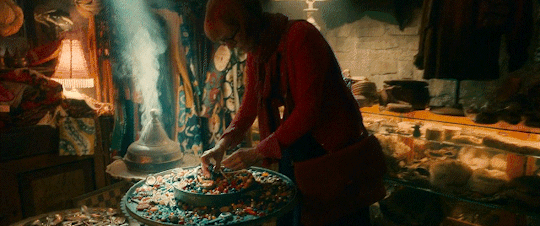
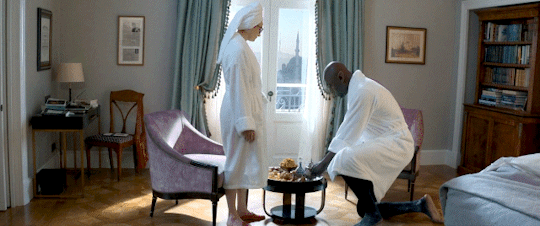
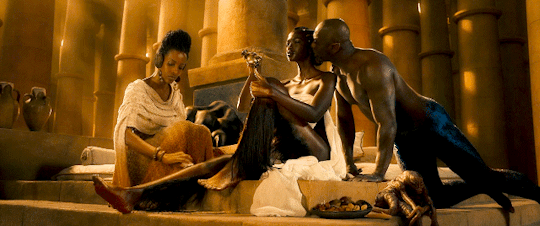
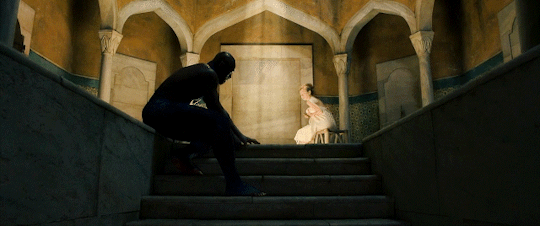



Three Thousand Years of Longing | Directed by Frank Miller (2022)
#three thousand years of longing#i'm very sad because this movie failed to live up to its potential so hard#i learned about from tumblr i went to watch the trailer the trailer was AMAZING#the movie started strong than it became steadily worse as it went on#for a bit while the djinn was telling his stories kind of felt like the fall#but then i don't know#the story got less interesting#the visuals got less interesting#there were title cards for some sections but not others?#i don't know i had high hopes and i'm now very disappointed#also sorry about the first gif but i just loved that transition XD#films i watched in 2022#i made this#i just want a tag for the things i personally put out into the world
61 notes
·
View notes
Text
hey all you sims 4 occult lovers!!!
I got a new mod for you!! Djinnify Me! by NeedCoffee4That is the perfect thing for you!
I personally helped playtest it and it was so much fun!
Embark on a mystical journey through the realms of magic and beyond! Discover forgotten ancient knowledge, gain mystical powers and become an immortal supernatural being: A Djinn.
"Djinnify Me!" is a text-heavy story adventure mod where your Sim can set out on a challenging journey to become a Djinn.
#the sims 4#ts4 mods#occult#ts4 occult#sims 4#sims4#ts4 occults#sims#storytelling#ts4 story#mods#s4cc download#s4cc#mods and cc#modders#djinn
5 notes
·
View notes
Photo
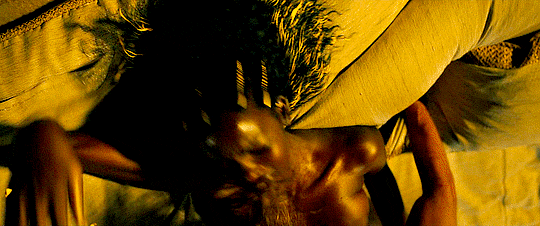


Three Thousand Years of Longing (2022)
George Miller
#three thousand years of longing#george miller#mygifs#gifset#idris elba#aamito lagum#nicolas mouawad#djinn#myth#narrative#story#magic
81 notes
·
View notes
Text
~❦Dear friend of mine❦~
|M!Genie x F!Reader|
It sure has been a while since I've posted something huh ._.
I was scrolling through my phone today since I recently got a new one and found this in one of my folders, so I thought why not share it? (ノ^_^)ノ
I hope I did good enough with this one (;^ω^)
There is not enough Genie stories around in my opinion, so here you go
Also anyone who recognizes or knows who this character's appearance is heavily based of/inspected by, here's a cookie 🍪~
Anyway enjoy (~ ̄³ ̄)~
WARNING: SOME SWEARING
Part 2: Click
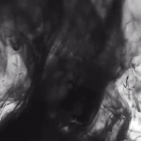
"Thank you! Please do come again!", thanking the seller as well, you take the bag full of snacks and other tasty treats from the man and continue your way through the different stalls. The wonderful different scents of all kinds of fresh made foods wafts through the air and into your nose each breath you take in.
Finally after a rough day at school you got to go home and enjoy the weekend, all cozied up in a nice blanket, watching all your favorite shows with all the nice treats you just bought for yourself in the local outdoor market.
The market opens only for a week before you have to wait for another three more until you're able to go there again. And you won't miss this opportunity on getting the best self made caramel candies from old granny Lauren.
She always gives those out to her costumers after buying one or more of her many different knick knacks she found and collected. Where she finds these things has always been a mystery to you, she never gave you a proper answer. Mostly because she actually forgot where she picked a certain thing up.
Your (e/c) eyes spot the familiar older woman, wearing her grey hair in a bun and red rimmed glasses sitting upon her nose, cleaning some of her newest collections with a feather duster.
With a smile you greet her, "Good afternoon Ms. Lauren!", "Hello dear, back from school I assume? Did you have fun?". Giving you one of her own sweet smiles she places her duster away and turns her attention towards you. A small sigh escapes through your lips, as your gaze flickers briefly to the ground. "The usual?", with a nod of confirmation to her question you continue. "Today was actually not as bad as usual. Luckily, I have a few more weeks and exams to go and then I'm out of there."
Lauren hums along with your words as she puts the caramel candies in one of her colorful boxes, while you're checking out her newest collection. The things ranging from colorful jewelry, figures to all other kinds of stuff. But one of them seems to stand out to you the most, a lamp. It looks dark and dusty, unlike the colorful nesting dolls standing in front of it.
Your (e/c) gaze lingers on the object, feeling oddly drawn to it as if it's pulling you towards it. "Ooh are you looking at the oil lamp dear? I can't really recall where got it... But I thought I might as well just sell it off. I tried lighting it up but it didn't work. Maybe you can find some use for it."
Snapping out of whatever just happened you began pondering a little on wether or not to buy it.
At the end you decide to take it, along with a few bracelets you liked. "I will be taking these and the lamp Ms. Lauren.", "Good joice my dear, I'll give you a discount for buying the lamp. And here are the caramel candies you like so much." She hands you a small plastic bag with the candies, bracelets and the dark lamp inside, offering you another kind smile.
"Are you sure? I can pay the lamp as well.", you already know she's going to reject your offer, yet you still ask her whenever you're visiting her stall. 'Oh well. Can't complain if I'm getting something cheaper! Not to mention free candy!', you think as you hand her the money. The both of you say your goodbyes and you finally make your way back home.
The sun is starting to set once you make it to the doorstep of the apartment, the vibrant hues of red and purple slowly fading in the distance as the sun vanishes behind the buildings and horizon.
A soft gust of wind blowing through your (h/c) hair. You enjoyed watching those in the past and you still do, but you're just too tired at the moment. Things change after all. Once you finally made it to your room, you pull off your (f/c) jacket and shoes, before placing your bags on the small table standing in front of your couch.
Not wasting any more time you throw yourself on the couch and grab a blanket, wrapping yourself up like a borito. You reach for the remote and turn on one of your favorite shows on Netflix, your other hand shuffling through the small plastic bag to grab the box of delicious candy and plop them into your mouth after opening the pink lid. And if you already started taking out some stuff out of one bag, why not everything? You thought to yourself. Placing the bag of treats aside you take the other and pick out the bracelets, until your fingers brush against the cold surface of the oil lamp.
Carefully grabbing it with both hands you turn it around to get a better look at it, some of the dust particles which haven't come off yet clinging onto your fingertips and palms. "Great. Let's get you cleaned first before I make more of a mess here." You sigh as you quickly stand up and get a wet cloth to clean the lamp with.
Starting with the nozzle you work your way around it, admiring the details of the engravings and the golden shine it gets back after getting properly cleaned. One red gem sitting at the nozzle and another close to the base of the handle.
"It looks like one of those magic lamps someone would find in movies or shows. Huh... It's pretty. I wonder if an actual Genie would come out after I rub it." Chuckling at the idea you quickly dismiss that thought.
There's no way something like that is ever going to happen. It's not a fantasy story after all. As you trace the golden rim that strange feeling that seemed to pull you towards this item from before comes flooding back and you have this strange desire to actually rub the lamp. And that's what you do.
At first nothing seems to happen after you snapped out of it once again, rubbing your temple from this weird occurrence. 'What's wrong with me today?! Have I slept even less than usual? No it can't be, I'm sure it was four hours. Or was it just two?' But then the metal in your hand begins to heat up.
Interrupting your train of thought and resulting your hand to toss it away, the lamp landing back on the table. The lid starts to shake and all of the sudden dark grey smoke starts spewing out of the nozzle, rising up towards your white ceiling.
Your (e/c) widen in shock, not having any idea of what's going to happen you quickly hide behind your couch to take cover, just peaking over the backrest to witness what's about to happen next.
"W-What the hell is happening!?", you squeal in fear when suddenly a loud and powerful explosion goes off from the nozzle. The floor and furniture shaking, making you clutch onto the couch for support, the sheer force making you shake in your kneeling position as well. Fully taking cover you tightly close your eyes, your arms above your head. Your legs tremble underneath you, and only then when you're feeling sure enough that everything was over after a long moment of silence you take another peek.
"Greetings Mortal. You have rubbed the lamp and released me, the heavens have been opened and your wishes will be granted!"
There floating in the middle of your living room is a young, lean and fairly muscular looking man with long black hair segmented in a single ponytail, which reaches down to his ankles. He's wearing a white scarf on his shoulders, underneath it a black choli with golden hems, black harem pants and golden bangle bracelets that extend from his elbows to his wrists, as well as a golden bangle necklace with a ruby in the center.
His booming voice falling silent when his red ringed eyes fell upon your form that's slowly rising up from your hiding spot, staring in shock and bewilderment at the being you just released. "Ah... A peasant girl. Well that should be over quick and easy.", he quietly mutters to himself in a normal voice now, holding his chin in thought. You did catch every bit of it though, which makes you feel just a little bit offended. Sure you're not the richest person alive but still.
He quickly puts on a smug grin and floats over to you, his voice once again gaining on volume. "I see you're still speechless, I don't blame you. It's not everyday you'll get your hands on a magical lamp like this. With one of the most powerful beings on earth!", disappearing and reappearing behind you, he shoves his lamp into your grasp while one of his hands rests on your left shoulder, his face on your right a little to close for comfort. His dark strands tickling your (s/c) cheek.
"You are the one who released me right?", he asks, dark eyebrows raised in question. "Uhm yes?", you're confused.
How is it possible? You thought things like that only existed in stories or legends, or fairytales. Never in your life would you have ever expected to meet a real Genie in your apartment room. Let alone ever awakening one yourself. So you couldn't help but ask and prod at him, just to make sure you're not imagining things as you pull on his cheeks.
"Are you really a real Genie? I'm not dreaming right, where are the cameras? This must be some kind of prank right? Some silly joke the neighbors must've set up!"
The pale skinned male winces from the sudden uncalled for gesture and with a grunt he pulls himself away. "I assure you not!", he growls out, his words echoing as he speaks and rises up behind you gaining in size, glaring you down with his burning gaze.
"YOU, are my master now. And I, grant three wishes to the one who has rubbed the magic lamp. Do you want to be famous? Powers you could only imagine in your wildest dreams? Unendless amounts of riches? Just tell me anything what you wish for and it all shall be yours." he exclaims a hint of annoyance lacing on the whole 'whishes' part.
"Now, that we got that cleared up. Wish away.", you blink up at him at his sudden change of demeanor. His menacing aura now replaced once again in a blink of an eye. A grin once again adorning his handsome face, while waiting expectantly for you to make a wish as he wiggles his fingers. Dark sparkles dancing around them. Sure, if you were a Genie trapped inside a lamp in like maybe hundreds of years and only being able to get out of there when granting someone's wishes, you would not be feeling any better than this man.
He seems rather determent on getting over with your wishes, but wouldn't that mean he will just quickly end up in that lamp again? You also don't want to waste your wishes on simple things you can just solve yourself.
"So... You are a real Genie.", "Yes.", "And I get three wishes.", "That's what I just told you, yes." The being is slowly starting to get impatient. Why haven't you made your first wish yet?! Back then people knew about the existence of him and didn't need a whole ass explanation. Everyone else before you knew what they wanted and didn't waste any of his time! His frown only increases when you're about to ask another question, disappearing in a cloud of grey smoke he reappears once more a few feet in front of you, shrunken back to his normal size.
With a strained laugh he interrupts you, "Look, peasant girl. I don't have time or patience for all your questions and neither am I here to be your friend." You put your hands on your hips like a mother lecturing her child, "Ok. First of all, I'm not a peasant, also I didn't ask you to become my friend! I won't just call anyone my friend, you have to earn my friendship to become a real one. But if you want to, we can try being friends." He opens his mouth but closes it once again, caught of guard by your offering.
"Wait what...", he stutters, "W-Whatever! I don't need friends..", huffing he crosses his arms before continuing. "Are you going to wish for something or not?"
With a soft sigh you say, "Not yet.", "Not yet?", the genie repeats, letting out a bitter laugh.
"Listen carefully, I was inside this lamp for over thousand of years, served at least more than 20 masters up until now. They knew what they wanted and wished. Boom! Back in the lamp I went every single time having all the sweet time alone, by myself, in peace!", then he points an accusing finger at you, "And now you come along and can't even think of a single wish! Anyone has a wish! Everybody has something they oh so dearly want or desire! So the sooner we get this over with the better."
The being has a point, everyone could think of at least one thing they could wish for. This doesn't change your mind at all though.
You ponder, it sounded like he has no problem at all being trapped in this object, in fact he prefers to be alone in there. But wouldn't someone who's been trapped for this long at least try to be free? You're curious. After all, he did turn a bit more sour, more than he already was, when telling you this. Yet you did not let yourself get affected.
"Is there anything I can't wish for? I mean there must be something like consequences if someone can wish for pretty much anything right?" you ask, tilting your head towards him when you notice him eyeing your tv, having given up on convincing you for now. "Oh right I didn't tell you that did I?" With a shake of your head no he holds his hand up counting off the rules. "In short, no wishing for more wishes, no creating or ending life, and you also cannot effect free will. Meaning you can’t make a person feel a certain way with a wish. Other than that there are no consequences, I'm not that mean you know.", he puffes out his cheeks in a pout looking at you.
You thank him for explaining to you, it's better than not knowing about it and you feel better with that out of the way. The being already figured out it will take way longer than he initially thought, looks like he has to get comfortable with staying with you for some time longer.
Well that's a first.
He just hopes he won't get to attached to you. It's been so long ever since he had someone else to interact with let alone have someone as a friend after all. The ravenette has to admit, he did feel surprised and even happy when you offered your friendship. Not that he will ever tell you out loud.
"I'm (Y/n) by the way. It's nice meeting you and having you as my... uh well Genie. What's your name?", your hand reaches out towards him ready for a handshake, his red orbs gazing into your (e/c) ones. Name? All previous masters referred to him as either Genie or slave. None of them asked for his name before, and those who did either forgot it or didn't care afterwards. Reluctantly he places his hand into yours.
"Dhabruan."
#genie#x reader#genie x reader#mythical beings#multiple parts#djinn#stories#mythical creatures#magic#reader self insert#short story#female reader#male character
35 notes
·
View notes
Text

the djinn in the nightingale’s eye
#the djinn in the nightingale’s eye#a.s. byatt#literature#fairy tale#fairy tales#cottagecore#light academia#dark academia#studyspo#studyblr#booklr#spilled ink#writing#if you like fairy tales i recommend this aaahhhh#esp this story goes more into philosophy i would say?#existentialism?#not sure if there’s a better term for it#but i love the conversations about life and bodies
11 notes
·
View notes